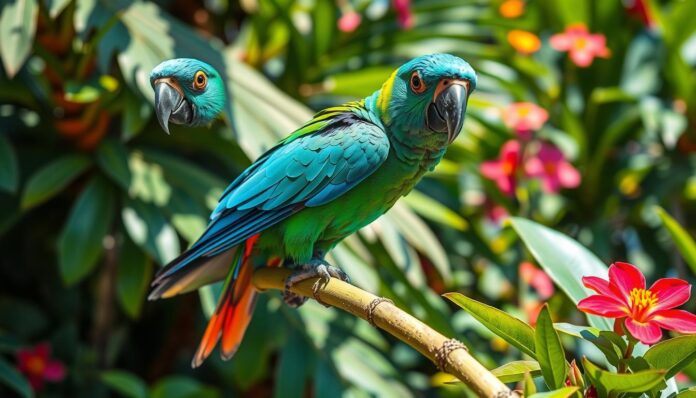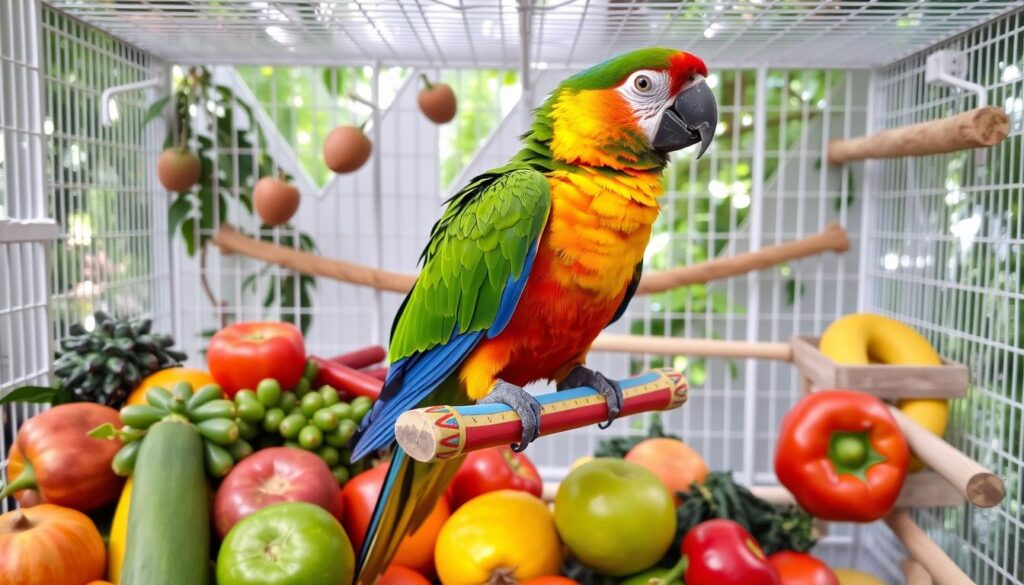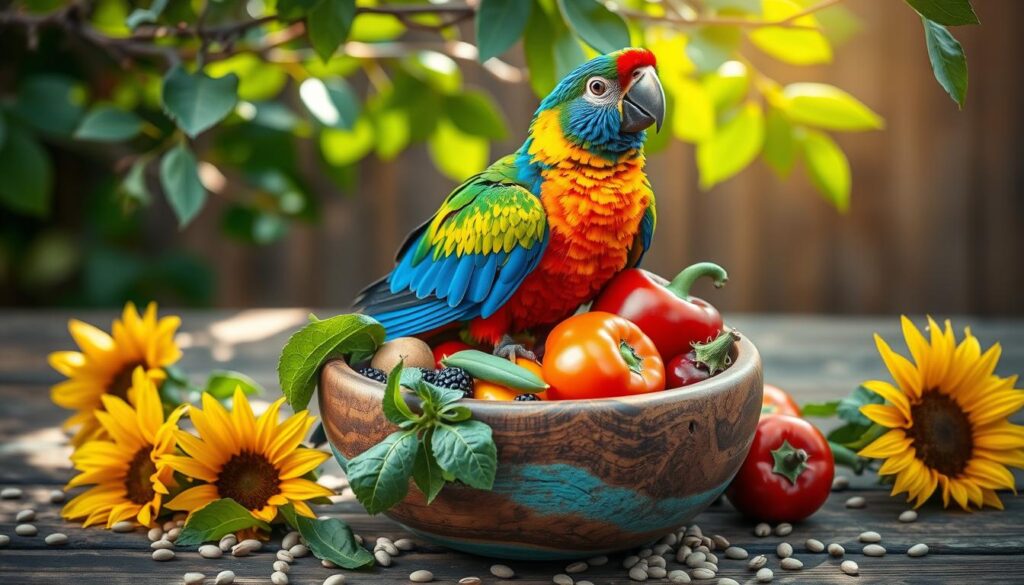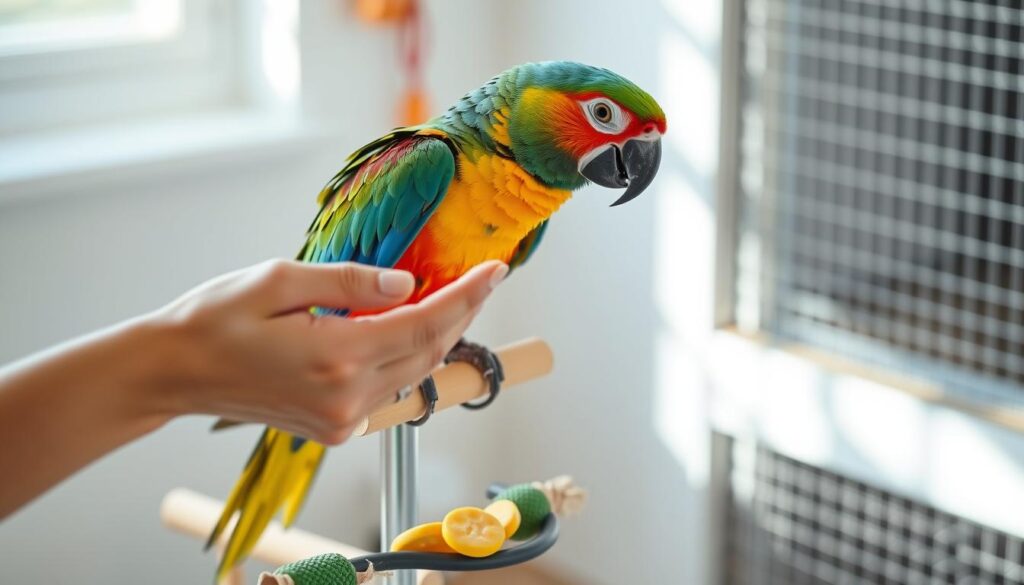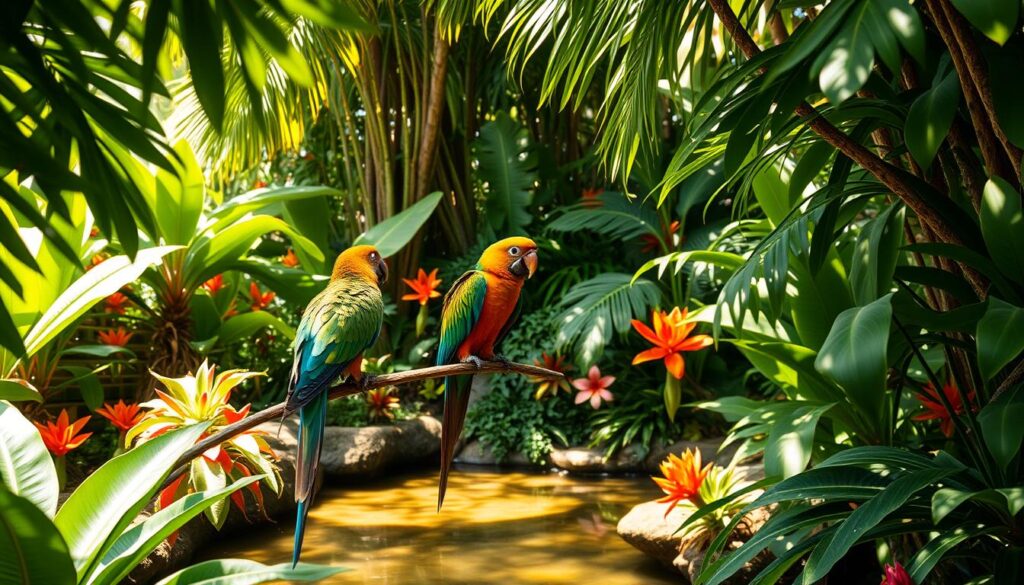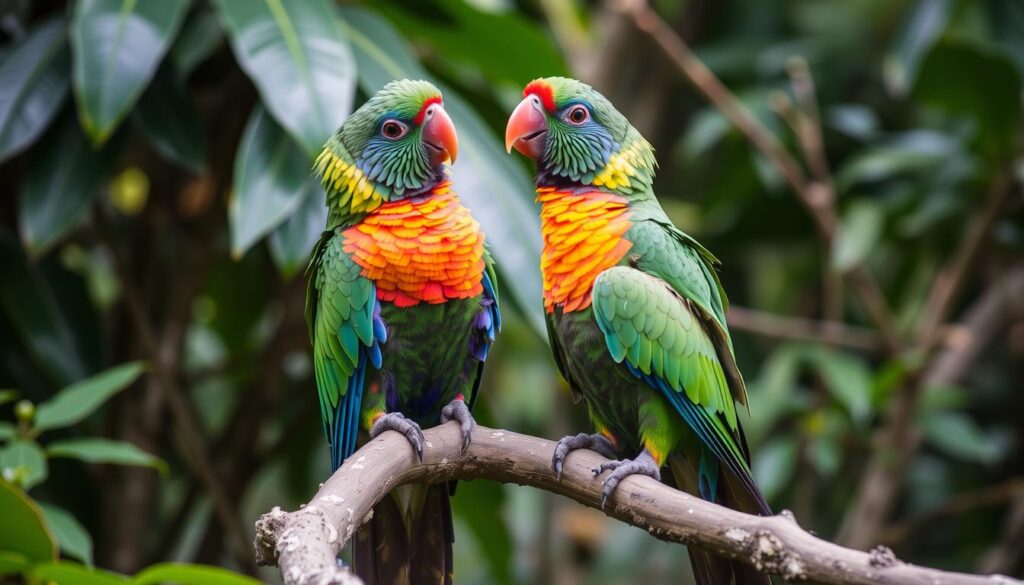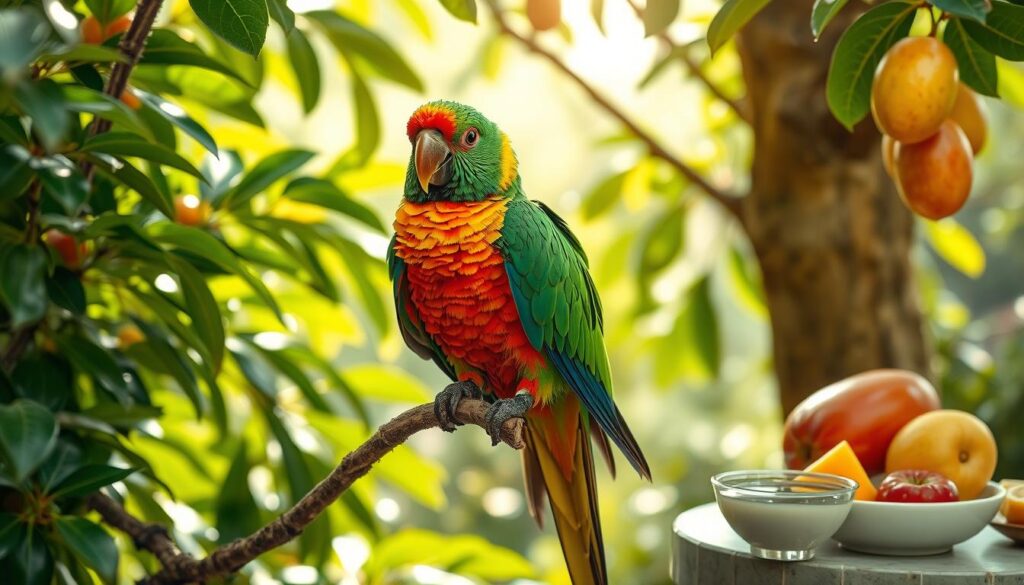A surprising fact about the pionus parrot is that it has a big personality. Despite being less known, it’s outgoing and fun. This makes it a great choice for those looking for a new pet.
The pionus parrot is known for being calm and less demanding. It’s a great choice for many because of its balanced traits. It’s a charming bird that makes a wonderful pet for bird lovers.
Introduction to the Pionus Parrot Species
Pionus parrots are known for their bright colors and friendly nature. They come from Central and South America. Knowing about their origin, habitat, and looks helps us see their beauty and uniqueness.
These birds live in Mexico, Central America, and parts of South America. They like forests, woodlands, and savannas. They live in groups, eating fruits, seeds, and nuts. There are 7-10 species of Pionus parrots, each with its own look and colors like blue, green, and red.
Origin and Natural Habitat
Pionus parrots come from the tropical areas of Central and South America. Their home shapes their behavior and looks. Most Pionus species are not in danger, thanks to stable populations.
Physical Characteristics
Pionus parrots are medium-sized, 10 to 12 inches long. They have a sturdy build and a square tail. Their feathers show off bright colors like blue, green, and red. These traits make them popular pets.
Common Pionus Species Varieties
Some well-known Pionus species are the blue-headed, Maximilian’s, and white-capped parrots. They are known for being gentle. For example, the blue-headed parrot has three subspecies with different looks.
In conclusion, Pionus parrots are unique and interesting birds. Knowing about their origin, habitat, and looks helps us appreciate them. It also helps us care for them properly.
| Species | Length | Weight | Lifespan |
|---|---|---|---|
| Blue-headed Parrot | 10-12 inches | 200-250 grams | 45-50 years |
| Maximilian’s Parrot | 11-13 inches | 250-300 grams | 40-45 years |
| White-capped Parrot | 10-12 inches | 200-250 grams | 45-50 years |
The Distinctive Personality of Pionus Parrots
Pionus parrots are known for their distinctive and charming personalities. They make great companions. Their ability to mimic and their intelligence show in their distinctive behavior. They often do unusual and funny things.
Some key characteristics of the pionus parrot personality include:
- Playful and fun, enjoying interactive play and training
- Intelligent and capable of mimicry, making them engaging avian companions
- Less demanding and quieter than many other parrot species, suitable for apartment living
The pionus parrot personality is a big reason they’re popular pets. They can form strong bonds with their owners through play and training. With the right care, pionus parrots can become beloved family members.
Essential Pionus Parrot Care Guidelines
Proper pionus parrot care is vital for their health and happiness. A big cage is a must, with a size of 60 cm x 60 cm x 80 cm. The bars should be 1.5 cm to 2 cm apart.
Temperature and environment are also key. Pionus parrots need a varied temperature and a draft-free spot. They also need lots of toys and chances to move around outside their cage.
Some must-haves for pionus parrot care include:
- A large cage with adequate bar spacing
- A variety of toys, such as swings, ladders, and ropes
- Fresh fruits and vegetables daily
- A balanced diet that includes high-quality pellets
- Regular cleaning of the cage and accessories
By following these guidelines, owners can ensure their pionus parrots live happy and healthy lives.
| Category | Recommendation |
|---|---|
| Cage Size | 60 cm (length) x 60 cm (width) x 80 cm (height) |
| Bar Spacing | 1.5 cm to 2 cm |
| Temperature | Varying temperature range, minimal drafts |
| Exercise | Daily opportunities to leave the cage, variety of toys |
You May Like :- Eclectus Parrot Price: What to Expect
Understanding Pionus Parrot Health
Pionus parrots are quiet and loving, making them great pets. But, like all birds, they can get sick. It’s key to take them to the vet often to keep them healthy.
They might get fungal infections, aspergillosis, or visceral gout. These problems can be stopped or managed with the right care. This includes a good diet, exercise, and a clean home.
To keep your Pionus parrot healthy, remember these important points:
- Regular vet visits
- Watch for changes in behavior
- Feed a balanced diet with fruits, veggies, and pellets
- Make sure they have fresh water and a clean space
By following these tips and knowing about health issues, you can help your Pionus parrot live a long, happy life. With the right care, they can be amazing pets.
| Health Issue | Description | Prevention |
|---|---|---|
| Fungal Infections | Caused by poor hygiene and bad air | Keep the cage and accessories clean |
| Aspergillosis | A fungal infection that hurts the lungs | Give them fresh air and avoid mold |
| Visceral Gout | A serious condition that harms the kidneys | Feed them well and keep water fresh |
Dietary Requirements and Nutrition
A well-balanced pionus parrot diet is key for their health. Pionus Parrots need a mix of foods like vegetables, fruits, and pellets. Vegetables should be a big part of their diet. Fruits are okay but in small amounts because they have a lot of sugar.
Some veggies that Pionus Parrots like are:
- Carrots
- String beans
- Corn
- Squash
- Peas
- Broccoli
- Zucchini
- Sunflower sprouts
Fruits like grapes, strawberries, blueberries, and apples are tasty for them. But, nuts should be limited because they’re too fatty and can cause obesity.
A good pionus parrot diet also includes seeds, making up 10 to 15 percent of their food. Pellets should not be the only food they eat. Introduce pellets slowly to help them get used to them. Avoid processed foods with lots of salt and chemicals. A balanced diet ensures your Pionus Parrots stay healthy.
Training Your Pionus Parrot
Training a pionus parrot needs patience and consistency. Building a strong bond with your parrot takes dedication. Learning about their behavior and needs is important. Use positive reinforcement to teach basic commands like “come,” “step up,” and “no.”
Quality time with your parrot is key. Engage in play and offer various toys and activities. This stimulates their mind and body. Remember, every parrot is different, so what works for one might not work for another.
- Starting with short training sessions to prevent fatigue
- Using positive reinforcement techniques, such as treats and praise
- Being patient and consistent in your training approach
- Providing a variety of toys and activities to stimulate their mind and body
By following these tips and dedicating time tosocializationandbasic commands, you can build a strong and loving relationship with your pionus parrot.
Creating the Perfect Environment
Creating a good pionus parrot environment involves several key factors. The cage setup is very important. It should give the parrot enough room to move and exercise. A cage of at least 2x3x4 feet is recommended, with bars spaced 1-1.5 inches apart.
Also, toys and activities are vital for keeping the parrot happy and active. Offer a range of toys that encourage chewing, climbing, and foraging. Changing the toys often helps prevent boredom and keeps the parrot interested.
Safety is a major concern when setting up a pionus parrot’s home. The cage should be in a safe spot, away from drafts and dangers like windows and mirrors. Make sure the parrot’s area is free from harmful substances and materials.
- Provide a variety of toys and enrichment activities
- Rotate toys regularly to prevent boredom
- Ensure the cage is safe and secure
- Place the cage in a safe location, away from drafts and hazards
| Environmental Factor | Recommendation |
|---|---|
| Cage Size | Minimum 2x3x4 feet |
| Bar Spacing | 1-1.5 inches |
| Toys and Enrichment | Variety of toys, rotated regularly |
Social Behaviors and Interaction
Pionus parrots are calm and less demanding, fitting well into many homes. They love interaction and are fun companions. Knowing how they interact helps keep them happy and healthy.
Some important things about Pionus parrot social behaviors include:
- They often don’t get along with other parrots, preferring to be alone.
- They are social but not as loud as some other parrots.
- They have a quiet interaction style compared to many parrots.
It’s important to give Pionus parrots enough interaction and companionship. This means playing with them, socializing, and giving them attention. By understanding their pionus parrot social behaviors, owners can strengthen their bond and create a great home for them.
Lifespan and Long-term Commitment
Knowing the pionus parrot lifespan is key for those thinking of getting one. These birds live for 25 to 30 years. This means owners must commit for a long time. As they get older, their needs might change, affecting their diet, exercise, and vet visits.
It’s vital to care for a pionus parrot as they age. This includes regular vet visits, a healthy diet, and lots of play and social time. Owners need to adjust their parrot’s care as they get older. This might mean a more comfy home and handling any health problems.
Important things for pionus parrot owners to think about include:
- Creating a good home, like a big cage or play area
- Feeding them a balanced diet
- Getting regular vet care to keep them healthy
- Spending quality time with them, like playing and exercising
Also, owners should think about the cost of caring for a pionus parrot. Vet care can cost between $300 to $1,200 a year. They should also budget for food, toys, and other supplies.
Understanding the pionus parrot lifespan and the long-term commitment needed is important. With the right care, pionus parrots can live a happy life. They can bring joy and companionship to their owners for many years.
| Parrot Species | Average Lifespan |
|---|---|
| Pionus Parrot | 25-30 years |
| Amazon Parrot | 40-60 years |
| African Grey Parrot | 40-60 years |
| Eclectus Parrot | 30-50 years |
Breeding and Reproduction
To breed Pionus parrots, you need to know about their mating habits. This includes setting up pairs and creating the right nesting spots. A good diet and environment are key, with at least 50% of pairs needing aviaries for best results. Yet, there’s a lack of information on breeding Pionus.
Reproduction for Pionus parrots happens in spring, with a short breeding season. They need a nest box about 10″ x 10″ x 18-24″. Blue-headed Pionus are quite loud during breeding. They do better in aviaries than in large cages.
Mating Behaviors
Pionus parrots are not as common as some other colorful birds. Small breeders can raise a few babies a year, focusing on good care and education. But, big commercial breeders and untrained ones cause many problems. Most pet birds, about 75%, don’t make good breeders because they get too territorial and aggressive.
Nesting Requirements
They lay 3 to 4 eggs, and incubation lasts about 24-26 days. Chicks leave the nest at 8 to 10 weeks. Blue-headed Pionus are ready to breed at 3 to 5 years. Some birds can be friendly again outside of breeding season.
Chick Care
It’s important to care for chicks properly after they hatch. This includes feeding and socializing them. Breeding and reproduction of Pionus parrots help save the species. Knowing about mating behaviors and providing the right nesting sites are key for successful pionus parrot breeding.
| Species | Clutch Size | Incubation Period | Fledging Age |
|---|---|---|---|
| Blue-headed Pionus | 3-4 eggs | 24-26 days | 8-10 weeks |
Choosing Your Pionus Parrot
Thinking about getting a Pionus parrot? You should decide if you want to adopt or buy one. Knowing what Pionus parrots need is key. They need social interaction, the right food, and a good home. Prices vary from $200 to $900, based on the species.
A healthy bird means a happy pet. Look out for signs of illness like nasal discharge or a flaky beak. Knowing about common health problems, like respiratory infections, helps you care for your bird better.
Adoption vs. Purchase
Adoption and buying have their pros and cons. Adopting gives a loving home to a bird in need. Buying from a reputable breeder ensures a healthy bird with a known history.
What to Look for in a Healthy Bird
When picking a Pionus parrot, look for signs of health. Bright eyes, shiny feathers, and a lively spirit are good signs. A healthy bird is active, curious, and interacts well with its surroundings.
Preparing Your Home
Before your new pet arrives, prepare a safe and comfy home. Set up a proper cage, feed a balanced diet, and offer social and exercise opportunities.
| Pionus Parrot Species | Price Range | Lifespan |
|---|---|---|
| White-Capped Pionus | $200-$400 | 30-40 years |
| Bronze-Wing Pionus | $500-$900 | 40-50 years |
| Blue-Headed Pionus | $300-$600 | 30-40 years |
Conclusion
The Pionus parrot has won the hearts of many bird lovers. These parrots are known for their unique personalities and loving nature. They make great friends for those who care for them well.
Pionus parrots are a sight to behold with their bright colors and playful minds. They can live for about 30 years. This makes them a big commitment, but the joy they bring is worth it.
Whether you like the blue-headed Pionus or the white-capped, these birds can become part of your family. Knowing how to feed, house, and care for them is key. This way, your Pionus parrot can grow and be happy.
Starting a life with a Pionus parrot requires patience and love. With these, you can build a strong bond. This bond will fill your life with joy and friendship.
FAQ
What is a Pionus Parrot?
The Pionus Parrot is a medium-sized bird known for being playful and fun. They are not as flashy as some other parrots but have a unique charm. This makes them great pets for bird lovers.
What are the physical characteristics of Pionus Parrots?
Pionus Parrots are about 10 to 12 inches long and have a square tail. They come in different colors like blue, green, and red. They are known for being less flashy than other parrots.
What is the personality of Pionus Parrots like?
Pionus Parrots are very playful and fun. They are smart and can mimic sounds, which makes them entertaining. Their friendly nature makes them great companions.
What are the essential care requirements for Pionus Parrots?
Pionus Parrots need a big cage, a good diet, and lots of exercise. They also need a clean, safe place to live. Keeping their environment right is key to their health.
What are some common health issues in Pionus Parrots?
Pionus Parrots can get sick like any bird, including respiratory infections and feather plucking. Keeping them healthy with a good diet and clean environment is important. Regular vet visits are also a must.
How do I train and socialize my Pionus Parrot?
Start with basic commands like “come” and “step up.” Use gentle, consistent methods. Socializing is key as they love to interact. Be patient and positive when training.
What is the lifespan of a Pionus Parrot?
Pionus Parrots can live 25 to 30 years. This means a big commitment from their owners. As they get older, their needs change. You’ll need to think about the cost of caring for them too.
How do I choose the right Pionus Parrot?
Think carefully about adopting or buying a Pionus Parrot. Know what they need, like a good home and diet. Make sure your home is ready for them before bringing one in.


